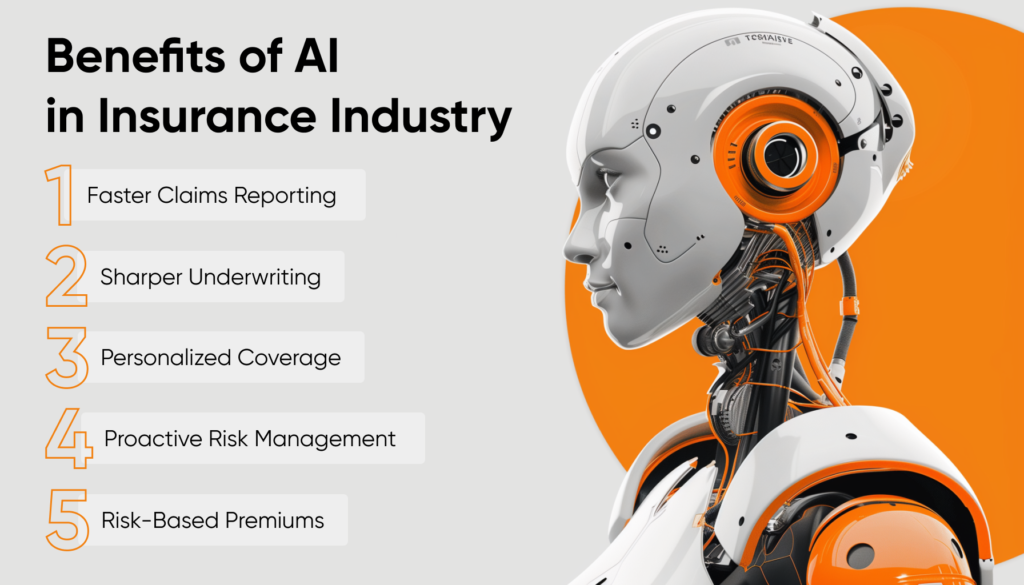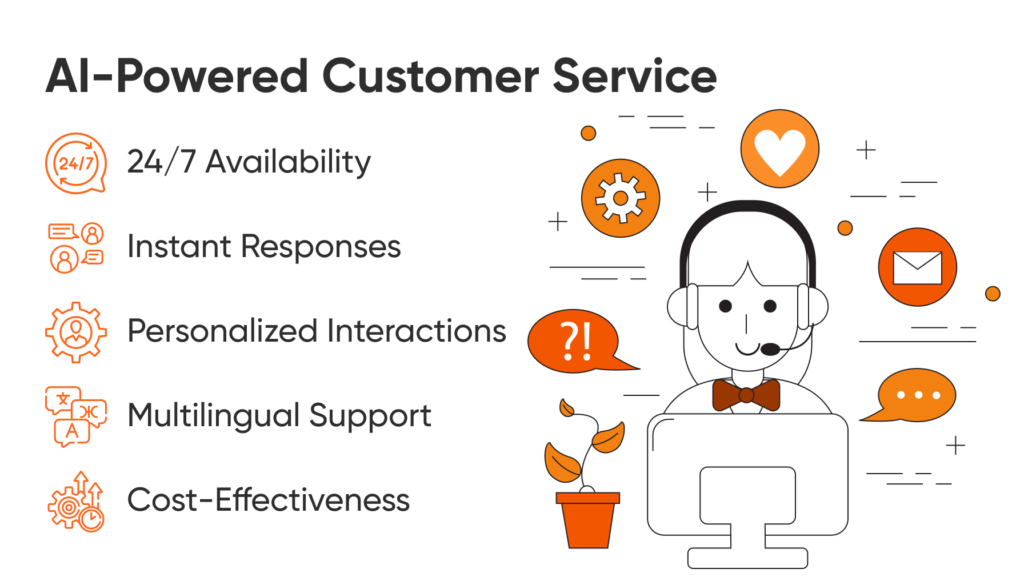Insurance Meets AI: Revolution in the Making
A I • Jun 12,2024

What You’ll Discover:
- AI in Underwriting & Risk Assessment
- AI in Claims Processing
- AI in Risk Management
- AI in Customer Service
- Bottom Line
Gone are the days of static insurance policies and impersonal claims processes. A wave of artificial intelligence is crashing over the insurance industry, bringing a wave of change. With this cutting-edge tech, every part of the insurance industry will change dramatically. Risk assessment, underwriting policies, processing claims—everything down to customer service will be affected.
Thanks to AI entering the scene, insurers can now handle tasks with greater speed and precision, all while giving clients customized attention. Here’s an inside view of how implementing AI technology is reshaping traditional practices within the insurance business.
This comprehensive guide explores the main uses of this technology and explains why it’s good news for both insurers and customers before diving into practical examples that illustrate these points clearly.
Imagine a future where AI completely reinvents the way we keep ourselves and what we own safe. It’s closer than you think!
1. Underwriting & Risk Assessment: AI-Powered Insights
Say goodbye to paperwork hassles and endless questions when applying for insurance. AI is here to shake things up in the world of underwriting and risk assessment! By crunching massive amounts of data, AI is giving insurers superpowers to understand your unique situation and offer personalized coverage. Here’s how AI is changing the game:
● Leveraging AI for Data-Driven Insights: AI helps insurance companies get a clearer picture of potential risks. It does this by examining a wide range of information, including past claims, customer details, how people behave, and even data from connected devices.
● Automated Underwriting: AI algorithms can automate routine underwriting tasks such as risk assessment, application review, and insurance decision-making. Thanks to these time-saving efficiencies, insurers can now focus their energy on developing exciting new insurance products and delivering exceptional customer service.
● Personalized Insurance Products: With a deep understanding of risks, AI can assist insurers in designing personalized insurance products that precisely match the needs and risk profiles of each customer. This leads to fairer pricing and better coverage for policyholders.
Real-world Examples
John Hancock, a US life insurance giant, ditched traditional pricing and embraced AI. Their new policies track activity, diet, and health habits through wearables and apps. Healthy behaviors like exercise earn discounts, while unhealthy choices may lead to higher premiums. This data-driven approach aims to incentivize healthy living and reduce claim costs for both insurer and policyholder.
Encova Insurance, a top 20 mutual carrier in the U.S., implemented an AI solution that halved review times, improved risk selection, and streamlined the experience for agents and policyholders. This resulted in increased efficiency, better risk management, and stronger agent relationships.

2. Claims Processing: Powered by Precision and Speed
The insurance world is undergoing a superhero transformation, and AI is leading the charge. Having conquered underwriting, AI now takes on the claims process, making it faster, smoother, and fairer for everyone.
● AI-Powered Fraud Detection: Advanced algorithms leverage extensive data analysis capabilities to identify potentially fraudulent claims with exceptional precision. This not only safeguards insurers from financial losses due to fraudulent activity but also ensures that premiums remain equitable for honest policyholders.
● Streamlined Claims Resolution: AI automates tasks like data entry and initial assessments to facilitate a more efficient claims process. This translates to quicker settlements for policyholders, minimizing stress and inconvenience.
● Claims Damage Assessment: Computer vision algorithms speed up damage assessments from images and videos, resulting in faster claims processing and improved accuracy. The system sends emails to customers when necessary information is missing, reducing the workload of employees who would otherwise clarify details over the phone.
Real-world Examples
Metromile, a leading U.S. pay-per-mile insurer, uses AVA, an AI-powered claims assistant. This solution helps drivers file claims by collecting damage photos, finding repair shops, and scheduling rental cars when needed. With AVA, Metromile can quickly resolve and pay claims. It can even reconstruct accidents like a “virtual witness,” reducing ambiguity and disputes.
The top insurance firm in the Nordics implemented an AI-powered document intelligence tool, achieving a 70% faster claim processing speed and freeing agents for personalized customer service. This resulted in increased efficiency, empowered agents, and transparent control over the AI system.
Leading U.K. insurer Aviva PLC implemented AI-powered technology. Utilizing the AI solution’s Optical Character Recognition (OCR) capabilities, they identified over 12,000 fraudulent claims exceeding £113 million in 2020. Additionally, AI has reduced manual work, facilitated faster claim resolution, and paved the way for a more personalized customer experience.
3. Risk Management: Proactive Protection with AI
The power of AI extends beyond underwriting and product design, playing a crucial role in proactive risk management. Here’s how AI is transforming this realm:
● Predictive Risk Modeling: AI algorithms can analyze significant volumes of data to identify potential risks before they materialize. This allows insurers to anticipate potential claims and take preventive measures. Imagine an insurance company using AI to predict weather patterns and proactively warn policyholders in high-risk flood zones, or analyzing driving behavior to identify risky drivers and offer targeted safety courses.
● Data-Driven Risk Management: Imagine AI as a super-powered detective for insurance companies. It gathers clues from everywhere—past claims, weather forecasts, even what people are saying online! This mountain of information helps AI understand risks better.
● Enhanced Company Resilience: The ability to predict and mitigate risks strengthens an insurance company’s overall resilience. By proactively identifying and addressing potential issues, AI helps insurers maintain financial stability and better manage unexpected events. This translates to greater peace of mind for both insurers and policyholders.
Real-World Examples
State Farm Insurance, the leading US auto insurer, utilizes AI to assess driver risk. Through machine learning, AI analyzes data like vehicle sensor readings, telematics information, and past driving records. This allows for accurate driver profiles based on their on-road behavior. This groundbreaking technology can enhance road safety, personalize insurance costs, and offer valuable insights for driver training and risk management programs.
Allstate, an American insurance company, leverages AI to analyze massive claim data to fight insurance fraud. This AI system flags suspicious claims based on factors like inconsistencies, claim frequency, and claim history. This frees human adjusters to focus on flagged claims, improving efficiency and reducing fraudulent payouts.
AXA leverages AI predictive analytics to anticipate health risks, craft personalized policies, and implement preventive measures. This data-driven approach enhances customer experience, promotes healthier lifestyles, and optimizes risk management.

4. Customer Service Soars with AI
Get ready for a customer service revolution in insurance! AI is transforming the way insurers interact with their clients, leading to a more personalized and convenient experience. Here’s how AI is driving customer satisfaction:
● Personalized Service: AI analyzes customer data to understand their unique needs and preferences. This allows insurers to offer tailored products, services, and support, ensuring customers feel valued and understood.
● 24/7 AI Chatbots: AI-powered chatbots provide round-the-clock support and information, answering questions, resolving minor issues, and assisting with tasks like payment processing and claim submissions.
Real-life Examples
An Australian auto insurer struggled with a complex online quote process, hindering customer conversion. To personalize the experience, they implemented an AI platform that analyzes customer data and recommends tailored insurance options using AI and machine learning. This resulted in a significant boost: online quote conversions jumped by 11%, and comprehensive car revenue grew by 5%.
Ageas, a major UK insurer, deployed a virtual assistant to answer customer FAQs 24/7. This AI agent resolves over 77% of simple questions on the first try, freeing up human agents for complex inquiries. Built in just 4 months, the solution improves customer service and reduces costs.
Lemonade, an innovative insurance company, leverages AI chatbots to personalize the customer experience. Maya, the company’s chatbot, guides website visitors through a questionnaire, helping them find the most suitable services and providing quick quotes. Another chatbot, Jim, expedites claims payouts. By embracing AI chats, they offer their customers a new level of engagement and support.
Bottom Line
AI is rapidly transforming the insurance industry, ushering in a new era of both personalized protection for customers and efficient operations for insurers. AI delivers a range of benefits, including:
- Personalized Coverage: By analyzing vast amounts of data, AI tailors insurance plans, pricing, and services to individual needs.
- Faster Claims: Automation and data analysis speed up the claims process, minimizing hassle for customers.
- Enhanced Fraud Detection: Advanced AI algorithms identify fraudulent activities with high accuracy, protecting insurers and ensuring fair premiums.
- Proactive Risk Management: AI helps predict potential risks, allowing insurers to take preventive measures and offer personalized safety recommendations.
- Improved Customer Service: 24/7 AI-powered chatbots provide convenient support, further enhancing the customer experience.
In the age of ever-evolving AI, we can expect even more advancements in this field, leading to a future of even more convenient, accessible, and innovative insurance services.
*****
Thanks for reading! We hope you enjoyed learning about AI’s impact on the insurance industry. We would love to hear your thoughts and questions in the comments!
Best regards,
the A1V Lab Team
Previos Article AI for Project Managers: Achieving More, Stress Less
Next Article 7 Ways AI is Making HR Superhuman